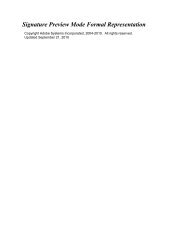14_1218_usss_pmp 2016
Create successful ePaper yourself
Turn your PDF publications into a flip-book with our unique Google optimized e-Paper software.
The Panel found that, due in large part to limitations on personnel, the Service's training<br />
regimen has diminished far below acceptable levels. The Presidential Protective Division's<br />
("PPD") so-called "Fourth Shift" had once ensured that for two weeks out of every eight, the<br />
President's detail was maintaining its strength, practicing, and getting better. But Secret Service<br />
reports show that in FY 2013, apart from firearms re-qualifications and basic career development<br />
technical requirements, the average special agent received only forty-two hours of training. The<br />
Uniformed Division has never trained at the level of PPD, but today training for the Uniformed<br />
Division has also fallen below acceptable levels. In FY 2013, Service data shows that the<br />
Uniformed Division as a whole received 576 hours of training, or about 25 minutes for each of<br />
over 1300 Uniformed Division officers. We believe that the Secret Service should be staffed at a<br />
level that enables it to provide a true Fourth Shift for training to its Presidential Protective<br />
Division and Vice-Presidential Protective Division special agents, and to ensure that Uniformed<br />
Division officers are in training for no less than 10% of their time.<br />
Providing more time for training requires increased staffing, but the Secret Service needs<br />
more agents and officers even beyond the levels required to allow for in-service training. The<br />
President and other protectees cannot receive the best possible protection when agents and<br />
officers are deployed for longer and longer hours with fewer and fewer days off. For years, the<br />
Service has taken on additional missions-in both its protective and investigative roles--but has<br />
not matched its request for additional resources to those expanded missions. The Service has to<br />
increase the number of agents and, to an even greater extent, increase the size of the Uniformed<br />
Division to ensure protection of the White House. We think that a new director should give<br />
serious consideration to whether there are collateral or non-essential missions that can be shed,<br />
though we believe the Service's investigative mission provides benefits to its protective mission.<br />
We also recognize that the new director must carefully manage the Service's other missions to<br />
ensure adequate resources are available to protection. But under any scenario, the Service has to<br />
increase significantly in size.<br />
This Report attempts to quant_ify the additional personnel needed, but the Panel has been<br />
hamstrung to some extent by the lack of complete data. Put simply, the Service does not have<br />
systems in place to make the most prudent budgeting choices. Like so many agencies, the /<br />
Service has, for years, looked at its base budget and tried to ballpark how much more it might be<br />
able to get through the OMB and congressional processes. The result, however, is that no one<br />
has really looked at how much the mission, done right, actually costs. That is why one of our<br />
most important recommendations is that a new director start with a zero-based budget. Forget<br />
about what the Service has asked for in the past: Define the mission, and make the argument to<br />
policy makers in the Executive Branch and Congress that this sum-which we believe to be<br />
more than current appropriations-is needed. As an interim step, the Panel recommends that<br />
Congress and the Executive Branch work together to ensure appropriations sufficient for an<br />
additional 85 special agents and 200 Uniformed Division officers; the Panel believes this is a<br />
first step, but likely not the last step, to ensure adequate training and personnel for the White<br />
House.<br />
The Panel also reviewed a variety of physical security and operational issues at the White<br />
House, and makes a number of recommendations about the ongoing security of the compound.<br />
Aspects of this discussion are classified, and the Panel believes strongly that operational issues<br />
5


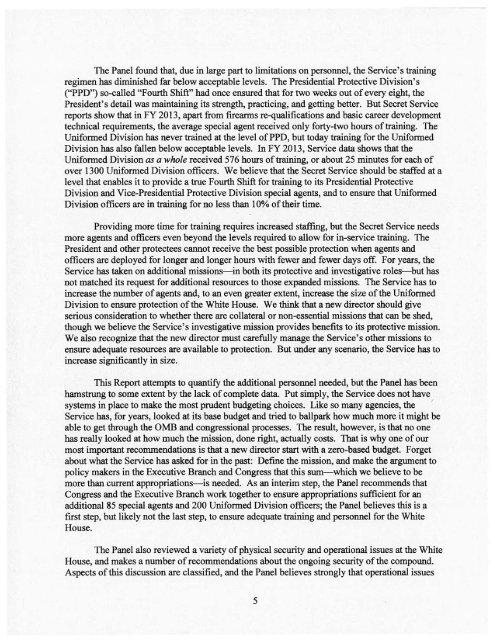

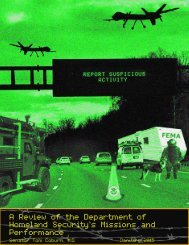

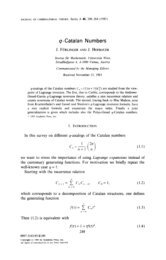
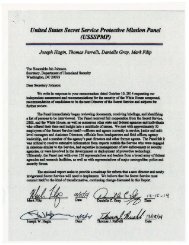
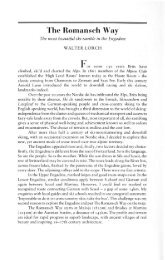
![55721335-d6fe09eb5ffdcc87dbf6c3f0b5bbda07d2261e98[1]](https://img.yumpu.com/56533583/1/186x260/55721335-d6fe09eb5ffdcc87dbf6c3f0b5bbda07d2261e981.jpg?quality=85)


